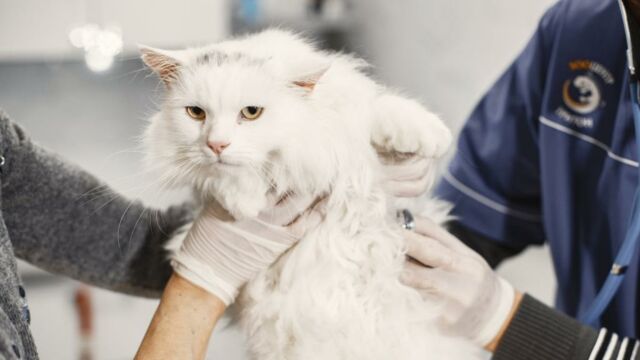From food sensitivities to hairballs, it can be difficult to differentiate between the causes of vomiting in cats. While it is nothing serious in most cases, it can indicate a life-threatening condition and should therefore never be ignored. Here is when to raise the alarm.
Discover our latest podcast
Watch the frequency of your cat's vomiting
A major sign to watch for in cat vomiting is frequency, Daily Paws write. If it’s a one-off occasion and your cat is fine afterwards, going on with its regular business, you shouldn’t worry. But if the kitty can’t stop doing it, talk to a specialist.
Ernie Ward, pet nutrition advocate and veterinarian, advises considering frequent vomiting a red flag, saying:
Cats who vomit and sit there quietly, as if they don't have the energy to get up afterwards, that’s a warning sign.

What does your cat vomit?
Another sign that can give you some clues is the content of vomit.
Undigested food might just mean your cat ate too fast. But vomit that is dry heaves of brothy, watery foam is something to pay attention to.
Dark, tarry or coffee ground-like bits in vomit can indicate partially digested blood, and that means a visit to the vet.
If cat vomit is yellow or pale green, that could be bile and indicate an underlying disease or condition.
As the vet will ask you to describe the colour and physical state of the vomit to assess the situation, it can be a good idea to take pictures and videos of the 'stuff' to speed the process up.

Does your cat have other symptoms?
Watch your pet carefully for any deviations from their normal behaviour and other clinical signs that may appear with vomiting. They can include dehydration, bloody or non-bloody diarrhoea, changes in drinking, reduced appetite, weakness, or weight loss.
When to call the vet?
Seek urgent help if your cat vomits more than two to three times in a row and has other symptoms, such as not eating and diarrhoea, as it can cause severe dehydration.
If the fluff-ball does not eat or drink for 12 hours all the while going through the vomiting ordeal, it’s important to call the vet right away.
It is also an emergency for cats already diagnosed with illnesses such as diabetes, kidney disease, and hyperthyroidism. Vomiting could mean that their disease is progressing. Early medical intervention is necessary for these patients.
Seek immediate vet support if your pet has vomited a worm. The situation calls for an acute deworming for them and other animals in the household and extra cleaning and poop-scooping measures on your side to avoid reinfection.
Sources used:
PetMD: ‘Why your cat is throwing up and what to do’
Daily Paws: ‘Cat Vomiting: Understanding What’s Normal—and What’s Not’
Read more:
⋙ This is the real reason why your cat buries its poop like treasure















